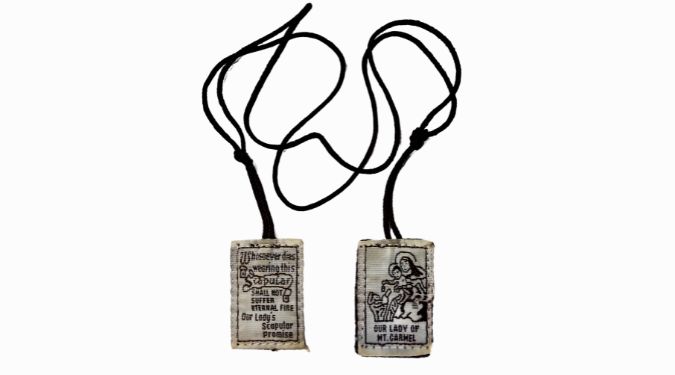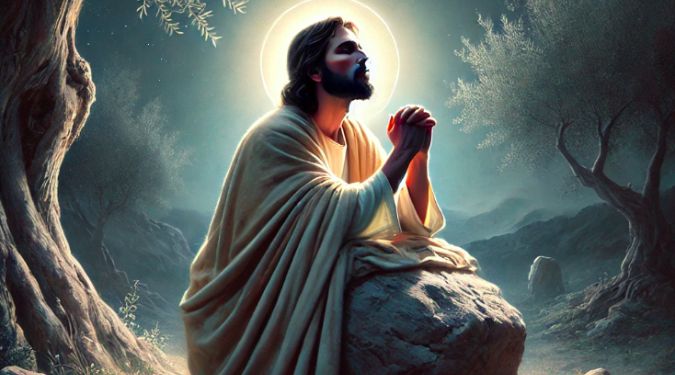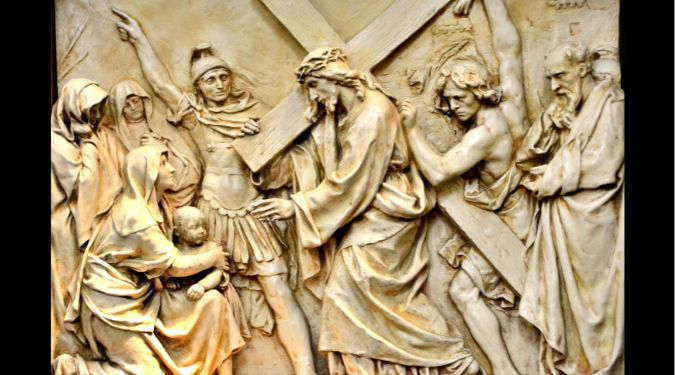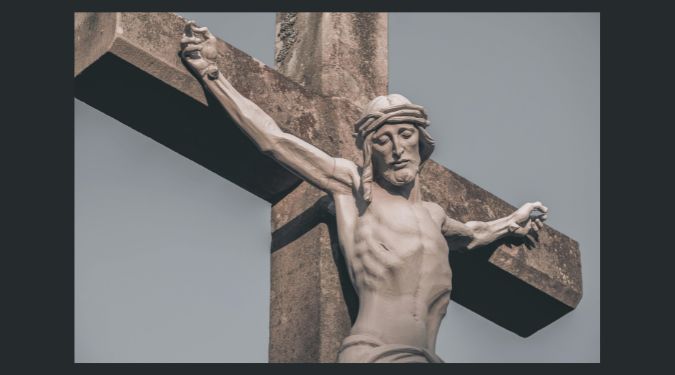The topic of the Brown Scapular arose in our weekly Catholic Study Group meeting this week. Most practicing Catholics with an appreciation for tradition know about wearing the Brown Scapular, even if they do not do so themselves. It’s a wonderful exercise in devotion to Our Lady and one that has some remarkable promises attached to it.
The Two Promises
In 1251, Our Lady appeared to St. Simon Stock, a Carmelite hermit and made this promise:
“Whosoever dies clothed with this habit shall be preserved from eternal fire. It is the badge of salvation, a shield in time of danger, and a pledge of special peace and protection.”
In 1322, Our Lady supposedly appeared to Pope John XXII and made this additional promise:
“I, the Mother of Grace, shall descend on the Saturday after their death and whomsoever I shall find in Purgatory, I shall free, so that I may lead them to the holy mountain of life everlasting.”
This controversial promise became known as the Sabbatine Privilege.
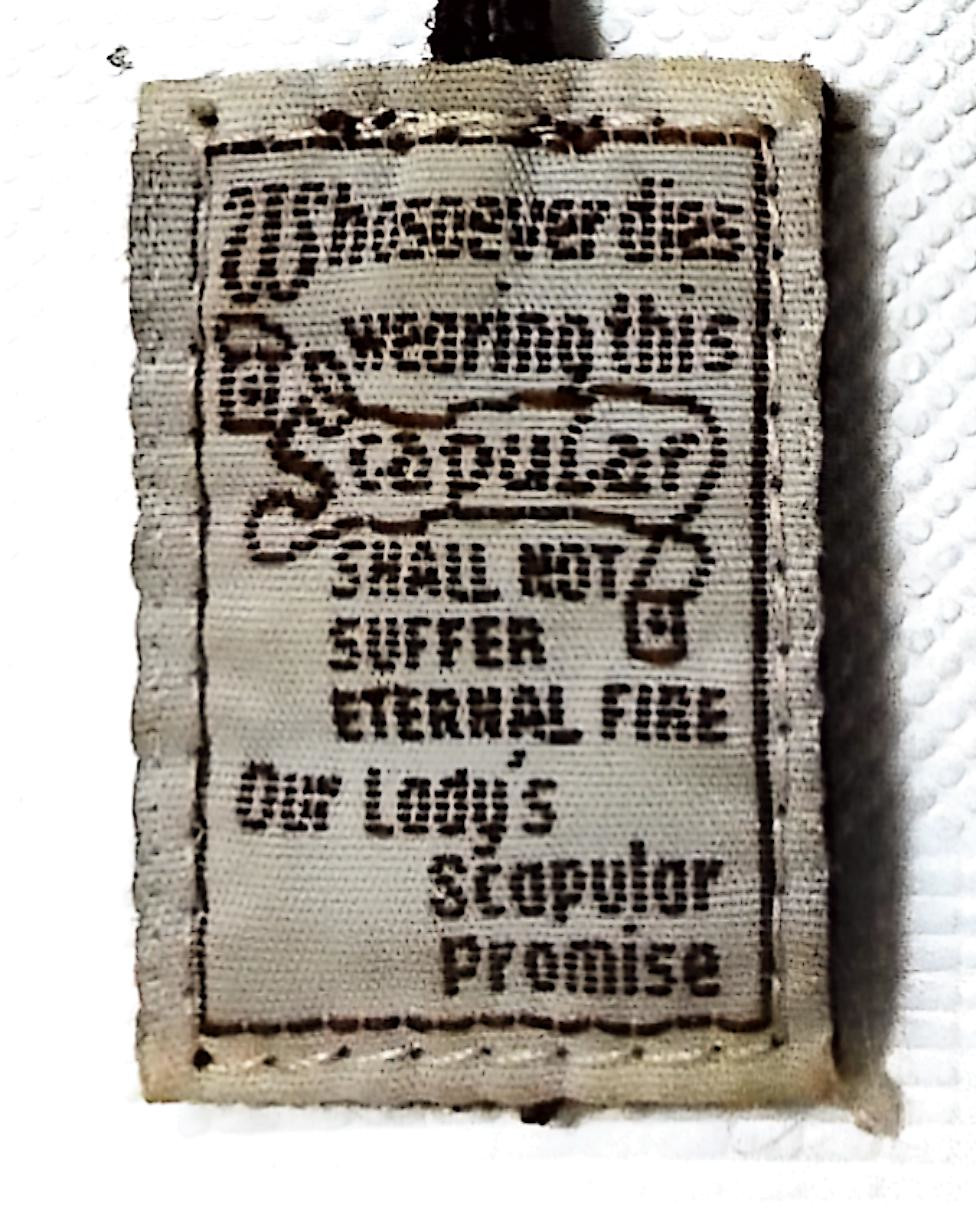
Is it superstition?
Can it be that one can go to a Catholic store, buy a scapular, wear it, and believe that no matter what, they will be spared from the fires of hell by merely wearing the scapular? Well, that would be superstition, and I don’t believe that the majority of scapular-wearers are superstitious.
The Catechism of the Catholic Church has this to say about superstition:
Superstition is the deviation of religious feeling and of the practices this feeling imposes. It can even affect the worship we offer the true God, e.g., when one attributes an importance in some way magical to certain practices otherwise lawful or necessary. To attribute the efficacy of prayers or of sacramental signs to their mere external performance, apart from the interior dispositions that they demand, is to fall into superstition. Catechism of the Catholic Church 2111
So, wearing the Brown Scapular without having the “interior disposition” it demands is to fall into superstition. And just what is the interior disposition required of wearers of the Brown Scapular?
The Required Interior Dispositions
One should not merely buy and wear the Brown Scapular. Devotees are expected to enroll in the “Confraternity of the Blessed Virgin of Mount Carmel” with the help and blessing of a Catholic Priest. The Brown Scapular is actually a miniature Carmelite habit worn by members of the Confraternity.
Here are the enrollment prayers: https://scapularap.com/enrollment-prayers
Here are two excerpts:
Lord Jesus Christ, Savior of the human race, sanctify by Thy power these scapulars…so that through the intercession of the same Virgin Mary, Mother of God, and protected against the evil spirit,…Thy servants…persevere until death in Thy grace.
Receive this blessed Scapular and beseech the Blessed Virgin that through Her merits, you may wear it without stain. May it defend you against all adversity and accompany you to eternal life.
That of course, implies that it can indeed be stained – and we are not talking about dirt or mud, but rather, about being stained by sin that is mortal. In short, wearers are to keep the Brown Scapular unstained through virtuous living and, we can only conclude, through frequent access to the Sacrament of Penance, beseeching the Blessed Virgin for this grace of perseverance.
So this is important: one is to “beseech” the Blessed Virgin that it will be worn “without stain”. The wearing of the Brown Scapular is actually a daily silent prayer that through the intercession of Our Lady, Our Lord will grant us the grace to persevere in holiness until death.
The Sabbatine Privilege
This supposed promise, which asserts that Our Lady will descend into Purgatory on the Saturday after the death of a wearer of the Brown Scapular (and who performs some other pious acts) to bring them into heaven, has been re-articulated by the Church as:
It is permitted to the Carmelite Fathers to preach that the Christian people may piously believe in the help which the souls of brothers and members, who have departed this life in charity, have worn in life the scapular, have ever observed chastity, have recited the Little Hours [of the Blessed Virgin], or, if they cannot read, have observed the fast days of the Church, and have abstained from flesh meat on Wednesdays and Saturdays (except when Christmas falls on such days), may derive after death — especially on Saturdays, the day consecrated by the Church to the Blessed Virgin — through the unceasing intercession of Mary, her pious petitions, her merits, and her special protection.
“Sabbatine Privilege.” The Catholic Encyclopedia. Vol. 13. New York: Robert Appleton Company, 1912. <http://www.newadvent.org/cathen/13289b.htm>.
